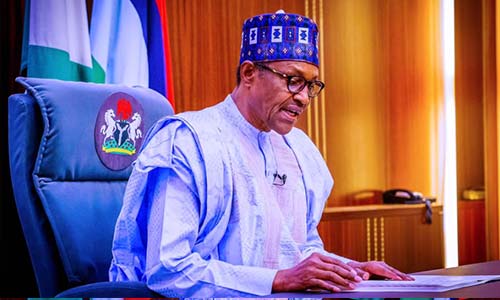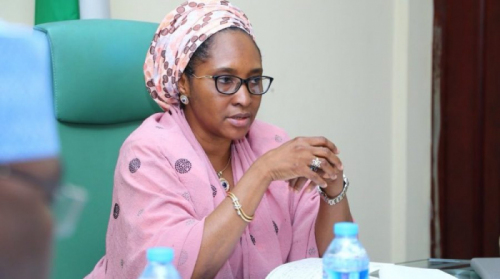THE EXECUTIVE 26/02/2022
Buhari Wants Section 84(12) Deleted In Newly Signed Electoral Act Amendment Bill

President Muhammadu Buhari has assented to the Electoral Act Amendment Bill 2022, with a declaration that the introduction of new technology, and efforts to engender clarity and transparency, holds a lot of promise for improving the election processes in the country.
He put his signature on the document at exactly 12:27 during a ceremony at the presidential villa, Abuja on Friday.
The ceremony was witnessed by the Senate President, Ahmed Lawan, Speaker of the House of Representatives, Femi Gbajabiamila.
The document was placed on a table for signing by the Senior Special Assistant to the President on National Assembly matters (Senate), Senator Babajide Omoworare.
The President suggested tinkering with Section 84(12), which he expressed dissatisfaction with as he noted that it contravenes the rights of political office holders to vote and be voted for in political party conventions and congresses.
The signing of the bill followed pressure from across sections of the country with the delay leading to open protests by members of the Civil Society Organizations (CSOs).
Buhari commended what he called the reformative and progressive nature of the Act but insisted that Section 84(2) should be deleted.
He said: “Distinguished Senators and Honourable Members of the National Assembly, from the review it is my perspective that the substance of the Bill is both reformative and progressive. I am making this bold declaration because I foresee the great potential of the Bill. Worthy of note include the democratic efficacy of the Bill with particular reference to sections 3, 9(2), 34, 41, 47, 84(9), (10) and (11) among others.
“This, however, cannot be said about one provision as contained in the proposed Bill, which provision constitutes a fundamental defect, as it is in conflict with extant constitutional provisions.
“Section 84 (12) constitutes a disenfranchisement of serving political office holders from voting or being voted for at Conventions or Congresses of any political party, for the purpose of the nomination of candidates for any election in cases where it holds earlier than 30 days to the National Election,’’ he said.
Quoting the section, “84(12); No political appointee at any level shall be a voting delegate or be voted for at the Convention or Congress of any political party for the purpose of the nomination of candidates for any election,” the President noted it had introduced qualification and disqualification criteria that ultra vires the Constitution by way of importing blanket restriction and disqualification to serving political office holders of which they are constitutionally accorded protection.
He added: “The practical application of section 84(12) of the Electoral Bill, 2022 will, if assented to, by operation of law, subject serving political office holders to inhibitions and restrictions referred to under section 40 and 42 of the 1999 Constitution as amended.
“It is imperative to note that the only constitutional expectation placed on serving political office holders that qualify, by extension as public officers within the context of the constitution is resignation, withdrawal or retirement at least 30 days before the date of the election.
“Hence, it will be stretching things beyond the constitutional limit to import extraneous restriction into the constitution on account of the practical application of section 84(12) of the bill where political parties’ conventions and congresses were to hold earlier than 30 days to the election.
“Arising from the foregoing, with particular regards to the benefits of the Bill, industry, time, resources and energy committed in its passage, I hereby assent to the Bill and request the National Assembly to consider immediate amendments that will bring the Bill in tune with constitutionality by way of deleting section 84(12) accordingly.’’
President Buhari commended the National Assembly for their commitment and dedication to improving the previous Electoral Bill 2021.
He further: “It is gratifying to note that the current Bill comes with a great deal of improvement from the previous Electoral Bill 2021. There are salient and praiseworthy provisions that could positively revolutionize elections in Nigeria through the introduction of new technological innovations. These innovations would guarantee the constitutional rights of citizens to vote and to do so effectively.
“The Bill would also improve and engender clarity, effectiveness and transparency of the election process, as well as reduce to the barest minimum incidences of acrimony arising from dissatisfied candidates and political parties.
“These commendable efforts are in line with our policy to bequeath posterity and landmark legal framework that paves the way for a credible and sound electoral process that we would all be proud of.”
The President said he received inputs from relevant Ministries, Departments and Agencies of government, after careful and thorough reviews of the Bill and its implications to democratic processes, before signing The Electoral Act (Amendment) Bill 2022 into law.
Buhari noted that the National Assembly forwarded the Electoral Bill for Presidential Assent, via a letter dated 31st January 2022.
Speaking to correspondents after the ceremony, Senate President, Ahmad assured that the National Assembly will look into the President’s request to delete the contentious clause.
He said: “You know, this is a legitimate request. And that is why commend the president. I will commend him for so many things, but let me also qualify it that even though he had a disagreement with the section, especially clause 84(12), that talks about public political office holders, he still went ahead to sign the bill into law and that is to show his commitment and desire to have an electoral law that will ensure that we have better outcomes when we do election.
“So we will look at what is he asking for, I hope that they will send the request for the amendment in good time. Because time is of the essence, INEC is waiting. And because we don’t want to spill over some of these dates, unnecessarily.
“We will be expecting communication from Mr President with respect to this. And then the National Assembly in both chambers will look into the request for the amendment but on the whole, I think this is a wonderful development for this administration, for Nigeria, for the evolution and development and growth of democracy in Nigeria.”
Ahmad noted that with the Electoral Act ready, the Independent National Electoral Commission (INEC) should hit the ground running and ensure that successful elections are conducted in Osun and Ekiti elections this year and the general elections nationwide in 2023.
He further stated: “And for INEC, now you have what you need. INEC, you have to produce the best possible electoral exercise, right from probably the Ekiti and Osun offseason elections. And of course, in the 2013 general elections”.
Speaker of House of Representatives, Hon Femi Gbajabiamila, who also spoke, noted that if the provisions of the Act are properly managed by INEC it will mark a watershed in the nation’s election history.
He said: “I believe it’s a landmark piece of legislation and has far-reaching and I mean, far-reaching implications of the provisions contained therein. I can count off the head at least 10 to 15 provisions in that electoral law, that if properly executed by INEC, and the people who the laws are made for, it will be a turning point in the electoral history of Nigeria.
And we will witness, not just by mouthing free, fair and credible elections, but we will actually witness free, fair and credible elections moving forward.”



